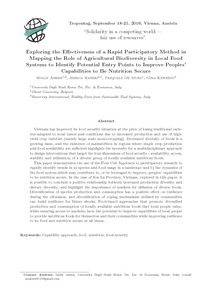Resource information
Vietnam has improved its food security situation at the price of losing traditional varieties adapted to local tastes and conditions due to increased production and use of high-yield crop varieties (mainly large scale mono-cropping). Decreased diversity of foods is a growing issue, and the existence of malnutrition in regions where staple crop production and food availability are sufficient highlights the necessity for a multidisciplinary approach to design interventions that target the four dimensions of food security - availability, access, stability and utilisation, of a diverse group of locally available nutritious foods.
This paper demonstrates the use of the Four Cell Approach to participatory research to rapidly identify trends in a) species and food usage in a landscape and b) the dynamics of the food system which may contribute to, or be leveraged to improve, peoples' capabilities to be nutrition secure. In the case of Son La Province, Vietnam, explored in this paper, it is possible to conclude a positive relationship between increased production diversity and dietary diversity, and highlight the importance of markets for diffusion of diverse foods. Diversification of species production and consumption has a positive effect on resilience during the off-season, and diversification of coping mechanisms utilised by communities can build resilience for future shocks. Food-based approaches that promote diversified production and consumption of locally available nutritious foods that local people value, while ensuring access to markets, have the potential to improve capabilities of local people to provide nutritious foods for themselves and their communities while improving resilience to be food and nutrition secure at all times


